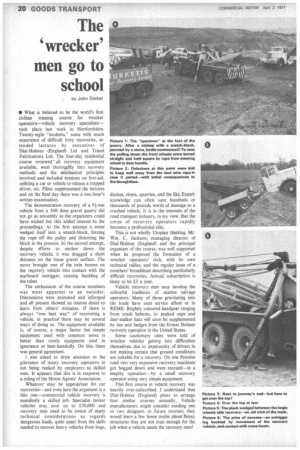The 'wrecker' men go to school
Page 22

If you've noticed an error in this article please click here to report it so we can fix it.
by John Darker • What is believed to be the world's first civilian training course for wrecker operators—vehicle recovery specialists— took place last week in Hertfordshire. Twenty-eight "students," some with much experience of difficult lorry recoveries, attended Lectures by executives of Dial Holmes (England) Ltd and Tracel Fabrications Ltd. The four-day residential course reviewed' all recovery equipment available, went thoroughly into recovery methods and the trkettanical principles involved and included sessions on first-aid, splitting a car or vehicle to release a trapped driver, etc. Films supplemented the lectures and on the final day there was a one hour's written examination.
The demonstration recovery of a 9f-ton vehicle from a 50ft deep gravel quarry did not go as smoothly as the organizers could have wished but this added interest to the proceedings. At the first attempt a stone wedged itself into a snatch-block, forcing the rope off the pulley and distorting the block in the process. At the second attempt, despite efforts to anchor down the recovery vehicle, it was dragged a short distance on the loose gravel surface. The move brought one of the twin booms on the recovery vehicle into contact with the starboard outrigger, causing buckling of the tubes.
The enthusiasm of the course members was most apparent to an outsider. Discussions were .animated and informed and all present showed an intense desire to learn from others' mistakes. If there is always "one best way" of recovering a vehicle, in practice there may be several ways of doing so. The equipment available is, of course, a major factor but simple equipment used with common sense is better than costly equipment used in ignorance or ham-handedly. On this, there was general agreement.
I was asked to draw attention to the grievance of many recovery operators in not being ranked by employers as skilled men. It appears that this is in response to a ruling of the Motor Agents' Association.
Whatever may be appropriate for car recoveries—and even here the argument is a thin one—commercial vehicle recovery is manifestly a skilled job. Specialist tanker vehicles may cost up to £30,000 and recovery men need to be aware of many technical considerations as regards dangerous loads, quite apart from the skills needed to recover heavy vehicles from bogs, ditches, rivers, quarries, and the like. Expert knowledge can often save hundreds or thousands of pounds worth of damage to a crashed vehicle. It is in the interests of the road transport industry, in my view, that the corps of recovery operators rapidly becomes a professional elite.
This is not wholly Utopian thinking. Mr. Wm. C. Jackson, managing director of Dial-Holmes (England) and the principal organizer of the course, was well supported when he proposed the formation of a wrecker operators' club, with its own technical rallies, and the regular issue of a members' broadsheet describing particularly difficult recoveries. Annual subscription is likely to be /3 a year.
Vehicle recovery men may develop the colourful traditions of marine salvage operators. Many of those gravitating into the trade have seen service afloat' or in REME. Brightly coloured headgear ranging from crash helmets, to peaked caps and deer-stalker hats will soon be supplemented by ties and badges from the Ernest Holmes recovery operation in the United States.
Some cautionary tales were told of wrecker vehicles getting into difficulties themselves, due to impetuosity of drivers in not making certain that ground conditions are suitable for a recovery. On one Pennine road two very expensive recovery machines got bogged down and were rescued—in a lengthy operation—by a small recovery operator using very simple equipment.
This first course in vehicle recovery was heavily over-subscribed. I understand that Dial-Holmes (England) plans to arrange four similar courses annually. Vehicle manufacturers might consider sending one or two designers to future courses; they would learn a few home truths about flimsy structures that are not man enough for the job when a vehicle needs the recovery men!




























































































